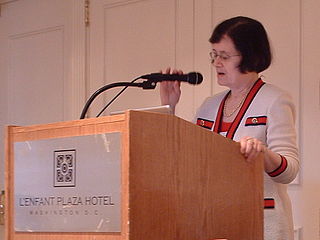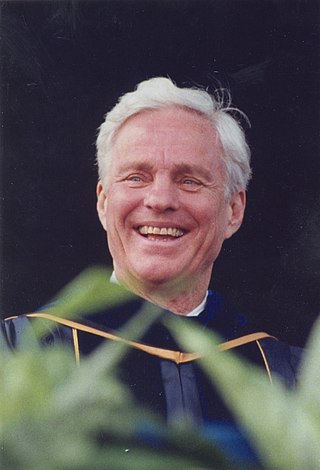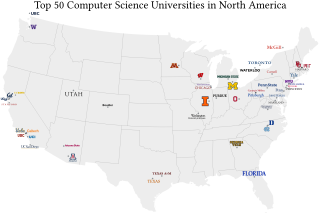Related Research Articles

Lynn Ann Conway is an American computer scientist, electrical engineer and transgender activist.

Barbara Bluestein Simons is an American computer scientist and the former president of the Association for Computing Machinery (ACM). She is a Ph.D. graduate of the University of California, Berkeley and spent her early career working as an IBM researcher. She is the founder and former co-chair of USACM, the ACM U.S. Public Policy Council. Her main areas of research are compiler optimization, scheduling theory and algorithm analysis and design.

Richard Chatham Atkinson is an American professor of psychology and cognitive science and an academic administrator. He is president emeritus of the University of California system, former chancellor of the University of California, San Diego, and former director of the National Science Foundation.
Heidi Elizabeth VanDerveer is a women's basketball collegiate and professional coach. She is currently the women's basketball head coach at UC San Diego.

Computer science education or computing education is the field of teaching and learning the discipline of computer science, and computational thinking. The field of computer science education encompasses a wide range of topics, from basic programming skills to advanced algorithm design and data analysis. It is a rapidly growing field that is essential to preparing students for careers in the technology industry and other fields that require computational skills.
Joyce Currie Little was an American computer scientist, engineer, and educator. She was a professor and chairperson in the Department of Computer and Information Sciences at Towson University in Towson, Maryland.
Susan Catherine Herring is an American linguist and communication scholar who researches gender differences in Internet use, and the characteristics, functions, and emergent norms associated with language, communication, and behavior in new online forms such as social media. She is Professor of Information Science and Linguistics at Indiana University Bloomington, where she founded and directs the Center for Computer-Mediated Communication. In 2013 she received the Association for Information Science & Technology Research Award for her contributions to the field of computer-mediated communication. She has been a fellow at the Center for Advanced Study in the Behavioral Sciences at Stanford University. Herring also founded and directed the BROG project.
The Association for Computing Machinery's Special Interest Group on Computer Science Education (SIGCSE) Technical Symposium is the main ACM conference for computer science educators. It has been held annually in February or March in the United States since 1970, with the exception of 2020 when it was cancelled due to COVID-19. In 2019, there were 1,809 attendees and 994 total submissions from over 50 countries, with a total of 2,668 unique authors representing over 800 institutions and organizations. There were 526 paper submissions, with 169 papers accepted across the three paper tracks which was up 5% over 2018. It is a CORE A Conference.
Nell B. Dale is an American computer scientist noted for her work in computer science education and computer science introductory programming textbooks. She was on the Association for Computing Machinery's Special Interest Group on Computer Science Education Board from 1981–85, and from 1987–93, and was Chair of SIGCSE from 1991–93. She was Chair of the SIGCSE Symposium in 1991 and Co-Chair of the SIGCSE Symposium in 2000.

Lise Getoor is a professor in the computer science department, at the University of California, Santa Cruz, and an adjunct professor in the Computer Science Department at the University of Maryland, College Park. Her primary research interests are in machine learning and reasoning with uncertainty, applied to graphs and structured data. She also works in data integration, social network analysis and visual analytics. She has edited a book on Statistical relational learning that is a main reference in this domain. She has published many highly cited papers in academic journals and conference proceedings. She has also served as action editor for the Machine Learning Journal, JAIR associate editor, and TKDD associate editor.
African-American women in computer science were among early pioneers in computing in the United States, and there are notable African-American women working in computer science.
The Consortium for Computing Sciences in Colleges (CCSC) is a nonprofit organization divided into ten regions that roughly match geographical areas in the United States. The purpose of the consortium is to: "promote, support and improve computing curricula in colleges and universities; encompass regional constituencies devoted to this purpose; and promote a national liaison among local, regional and national organizations devoted to this purpose." Predominantly these colleges and universities are oriented toward teaching, rather than research.
Barbara Boucher Owens is an American computer scientist noted for her leadership in computer science education. She was the Chair of SIGCSE from 2007 to 2010 and an elected member of the SIGCSE Board for 16 years from 1997 to 2013.
Gloria Townsend is an American computer scientist and professor in the department of Computer Science at DePauw University in Indiana. She is known for her work in evolutionary computation and her involvement with women in computing. She has served on the executive committee of the Association for Computing Machinery (ACM) Council on Women in Computing. She is the author of One Hundred One Ideas for Small Regional Celebrations of Women in Computing. In 2013, she received the Mr. and Mrs. Fred C. Tucker Jr. Distinguished Career Award for notable contributions to DePauw through her commitments to students, teaching excellence, their chosen disciplines, and service to the university.
Sarah Ann Douglas is a distinguished computer scientist, known for her work in human-computer interaction (HCI), a field of computer science that she has helped pioneer, and, in particular, pointing devices and haptic interactions, WWW interfaces and bioinformatics, and visualization and visual interfaces. She is a Professor Emerita of Computer and Information Science and a member of the Computational Science Institute at the University of Oregon.
Amber Settle is an American computer scientist and professor of education and theory in the department of Computer Science at DePaul University in Chicago, Illinois. She is known for her work in computer science education and her continuing service and leadership in Association for Computing Machinery (ACM) Special Interest Group on Computer Science Education (SIGCSE). She is also known for her work on computational thinking.

Lucila Ohno-Machado is a biomedical engineer and Deputy Dean for Biomedical Informatics at the Yale University School of Medicine. She is an elected member of the American Society for Clinical Investigation and the National Academy of Medicine.

Ilkay Altintas is a Turkish-American data and computer scientist, and researcher in the domain of supercomputing and high-performance computing applications. Since 2015, Altintas has served as chief data science officer of the San Diego Supercomputer Center (SDSC), at the University of California, San Diego (UCSD), where she has also served as founder and director of the Workflows for Data Science Center of Excellence (WorDS) since 2014, as well as founder and director of the WIFIRE lab. Altintas is also the co-initiator of the Kepler scientific workflow system, an open-source platform that endows research scientists with the ability to readily collaborate, share, and design scientific workflows.
Paula Birdwell Hawthorn is an American computer scientist. She is recognised as an expert and pioneer in database systems. She has also founded organisations for women in computer science and created affirmative action programs to support students in the field.

Duygu Kuzum is a Turkish-American electrical engineer who is a professor at the University of California, San Diego's Jacobs School of Engineering. She develops transparent neural sensors based on single-layer materials. She was awarded a National Institutes of Health New Innovator Award in 2020.
References
- ↑ Radiya-Dixit, Evani (23 October 2017). "Grace Hopper inspires reflection about diversity in tech at Stanford". The Stanford Daily. Retrieved 5 February 2019.
- ↑ Guzdial, Mark (2015). "Learner-Centered Design of Computing Education: Research on Computing for Everyone". Synthesis Lectures on Human-Centered Informatics. 8 (6): 1–165. doi:10.2200/S00684ED1V01Y201511HCI033. Archived from the original on 2019-08-30. Retrieved 2018-06-16.
- ↑ Lee, Cynthia (11 August 2017). "I'm a woman in computer science. Let me ladysplain the Google memo to you". Vox. Retrieved 16 October 2017.
- ↑ "Cynthia Bailey Lee". School of Engineering. Stanford. June 2017. Retrieved 16 October 2017.
- 1 2 "Cynthia Lee's Profile". profiles.stanford.edu. Stanford University. Retrieved 16 October 2017.
- ↑ "Allan Snavely of PMaC at University of California, San Diego". www.sdsc.edu. Archived from the original on 20 December 2008. Retrieved 18 October 2017.
- ↑ Lee, Cynthia Bailey (2009). On the user-scheduler relationship in high-performance computing (Thesis). UC San Diego.
- ↑ Lee, Cynthia B. "Curriculum Vita". Stanford. Retrieved 18 October 2017.
- ↑ Lee, Cynthia. "About". Peer Instruction for Computer Science. Retrieved 16 October 2017.
- ↑ "Cynthia Lee's Profile | Stanford Profiles". profiles.stanford.edu. Retrieved 2020-05-17.
- 1 2 Kris, Deborah Farmer (17 November 2016). "Steps Teachers Can Take to Keep Girls and Minorities in Computer Science Education". MindShift. Retrieved 18 October 2017.
- ↑ Women of Silicon Valley (3 December 2016). "10 Questions with Cynthia Bailey Lee". Medium. Retrieved 16 June 2018.
- ↑ Lee, Cynthia (10 October 2014). ""Such a Time as This," Remarks at Stanford Convocation". By Common Consent, a Mormon Blog. Retrieved 16 October 2017.
- ↑ Christiansen, Barbara (29 March 2016). "Stanford professor teaches young women, girls how to code". Daily Herald. Retrieved 16 October 2017.
- ↑ Sullivan, Kathleen J. (11 June 2019). "Stanford's 2019 Cuthbertson, Dinkelspiel and Gores awards honor faculty, students and staff". The Stanford Report. Retrieved 3 August 2019.
- ↑ "Teaching Professors Win Second SIGCSE Best Paper in Four Years" (Press release). La Jolla, CA: UCSD Department of Computer Science and Engineering. 11 March 2016. Retrieved 3 February 2019.